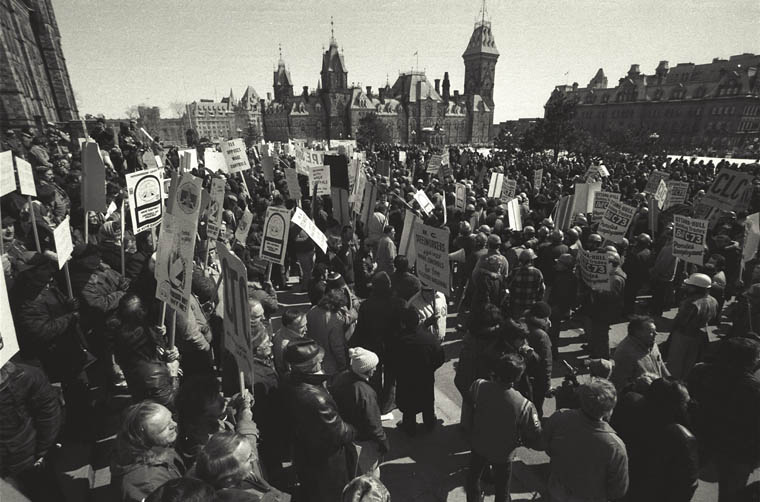Union work stoppages have become quite rare in Canada. In the current decade, strikes and lockouts have accounted for less than one-30th of one per cent of all working time — down more than 90 per cent from the strike-prone 1970s. The year 2016 set a new postwar low: just 631,870 days lost, breaking the previous record set in 1960 (even though today’s work force is more than three times bigger). And more of those disputes these days are lockouts — when employers stop production until the workers concede — rather than strikes, when unions take the lead.
Given that context, perhaps it’s not surprising many Canadians have forgotten (or never learned) how these things actually work. Someone who chanced upon a rare picket line might think it’s just a demonstration: protesters gathering to express an opinion. They have the right to demonstrate, but probably should do it politely.
However, picket lines are not demonstrations. Pickets are a form of economic warfare. It’s a process, accepted and protected by the courts and the Charter of Rights, whereby two sides impose costs on each other to compel agreement. The costs to the employer are lost production and profits; the costs to the workers are lost wages. The side that imposes a greater cost of disagreement on the other, while withstanding the costs they incur themselves, is likely to prevail. While not to be taken lightly, occasional work stoppages are a healthy part of normal industrial relations.
A refresher course in the reality of picket lines is now being provided by a small but nasty dispute in Gander, N.L. Thirty-two workers at D-J Composites, an aerospace components manufacturer, were locked out in December, 2016, for rejecting employer demands regarding wages and other contract provisions. The factory was originally built by CHC Helicopter in 1999, supported by provincial subsidies, and was sold in 2012 to new owners headquartered in Kansas (a “right-to-work” state where employers don’t have to bother with unions). The Newfoundland labour board has twice found D-J guilty of bad-faith bargaining, but the company is sticking with its demands and the lockout continues. Worse yet, D-J has hired replacement workers to keep some production going. Full disclosure: the locked-out workers belong to Unifor, the union I used to work for.
After 640 days, the employer is clearly hoping the union will just go away. That might work in Kansas, but it won’t happen here. New interest was generated this month, when Unifor released a one-minute video identifying some of the replacements (“scabs,” in union parlance) who drive through the picket line every day. Much hand-wringing occurred over this supposed “bully” tactic — although no less an authority than the Supreme Court has confirmed that a picket line is not a private event and people crossing them have no right to anonymity.
Through 640 emotional days, the picket line has remained peaceful: the only injury was a union member hit by a vehicle charging through the line during a snowstorm. But genuine economic violence is being done every day to 32 workers separated from their livelihoods by an aggressive employer. The employer’s position is all the stronger when it can hire others to keep working for less — but no replacement worker should ever think they can participate in that process without facing scrutiny or challenge.
Ironically, Newfoundland Premier Dwight Ball has a promising solution to this mess sitting right on his desk, in the form of recommendations from an Industrial Inquiry Commission convened by the provincial government in 2010 following a long dispute at Vale’s nickel operations in Voisey’s Bay. Headed by labour lawyer John Roil, and advised by Prof. Gregor Murray, labour-relations specialist at the University of Montreal, the commission recognized the traditional balance of power between employers and workers has been disrupted by the power and flexibility exercised by global corporations. They recommended modernizing labour law to ensure foreign firms understand and respect Canadian practices. They also proposed a fallback mechanism to arbitrate settlements in intractable disputes, so long as certain conditions are met, including failure to bargain in good faith.
Those sensible recommendations were never implemented, but they were tailor-made to prevent long work stoppages such as this one. Prohibiting replacement workers — especially during management-led lockouts — would also promote faster settlements; British Columbia and Quebec already do this. In the end, provincial intervention of some kind is essential to end this conflict.
The D-J Composites lockout, while small, is a telling reminder that employers hold the upper hand in most modern industrial disputes — and Canadian labour law has failed to address this imbalance. Economists and politicians alike bemoan persistently weak wage growth and stagnant household incomes. But this nasty little quarrel reveals exactly why this is happening. Governments across the country, starting with Mr. Ball’s, should watch and learn.
Jim Stanford is Harold Innis Industry Professor of Economics at McMaster University. This column originally appeared in The Globe and Mail.
Photo: Library and Archives Canada, e000756740/Wikimedia Commons
Help make rabble sustainable. Please consider supporting our work with a monthly donation. Support rabble.ca today for as little as $1 per month!




